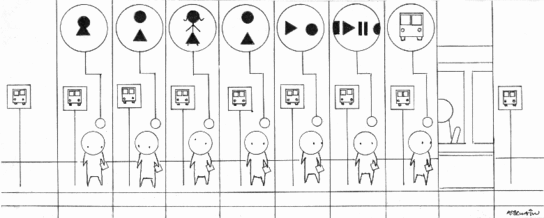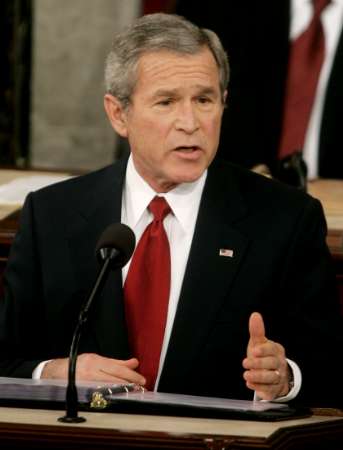
We can thank Howard Schultz for adding glamour, style and status to America's enjoyment of coffee — but to see that National Geographic devoted last month's cover story to java's active ingredient really makes one feel exotic.
For what it's worth, I'm about to make the evening's second cup of decaf.
Does alumnus loyalty win you perks? I was pleasantly surprised to find my friend Gabe's student webcache still hosted by the University of Chicago. For the latter part of his undergraduate tenure, he ran a biweekly comic strip in the Maroon that started good and only improved.
It just goes to show: achievement is aided by academia but by no means dependent upon it. My two, early, defining favorites here and here.
More on modern leftism, relativism, as mid-to-latter-20th Century teen angst: via National Review, a lament from the modest left on the Democratic Party's suicidal vainglory in its impending selection of Howard Dean as national chairman; and, via Craig Brett, Victor Davis Hanson's illustration of transnational oligarchs as late-sleeping idlers of the Western world.
One can't help thinking of the slacker's anthem by late Scottish quintet Ned's Atomic Dustbin, "What Gives, My Son." Presumably the band would have thought itself model in postmodern detached bemusement, and no self-reflection intended — but at least the mirrors work in this house.
While Seoul euphemizes, Tokyo slams fist in palm:
While the government continues to debate whether to use economic sanctions against North Korea to force progress on the abduction issue, officials say Tokyo might try to tighten the screws on Pyongyang through indirect means. Calls to impose sanctions increased after Tokyo announced that DNA tests showed the cremated remains Pyongyang claimed were those of abductee Megumi Yokota belonged to somebody else. Yokota was kidnapped to the North in 1977 and, according to Pyongyang, killed herself there in 1994....For example, a revised law on liability for oil pollution damage that will come into effect March 1 will deal a blow to North Korea because most of its ships will not qualify to enter Japanese ports, said a senior Foreign Ministry official who declined to be named. ...The law will "wring North Korea's neck" without openly naming the country as a target of sanctions, the official said.
The Japanese government seeks to punish dictator Kim Jong Il more or less in concert with the "six-party talks" employed by its American allies as a means of keeping North Korea trapped in a corner. Japan's rise in stature, maturation of national objectives and refinement of diplomatic methods is both commendable and indispensible in this post-Cold War world. It deserves comment as well as some application to the recent democratic victory in Iraq — both of which I hope to deliver before the weekend is over.
Meanwhile, Tim in Seoul has been looking north and has a roundup of news from North Korea's observers. Bottom line: something's happening to the Kim dynasty. With such a volume of emerging evidence we can qualify the initial round of conventional wisdom, if not dismiss it altogether until offered a better reason to believe all is still deadly calm in Pyongyang.
Some here, some there: according to the Bureau of Labor Statistics' latest report, non-farm payrolls grew by only three-quarters of surveyed predictions. But in spite of the strongest yearly productivity increases in fifty years the number of jobs rose; and the national unemployment rate, expected to remain steady at 5.4%, fell two-tenths of a percentage point.
SORRY, DEMOCRATS, NO HOOVER II: Thanks to Fox News' Carl Cameron, we can savor a little trivia: with the number of non-farm payroll jobs added in January and any upward revisions of past months, President Bush has presided over a net gain in jobs over four years.
Humor is a keen sense of the ludicrous, for laughter as well as ballast. A life unmoved ends in farce.

While I believe NASA and the European Space Agency have done fine jobs of presenting the Cassini-Huygens craft's snapshots from the Saturnine planetary system, open-source image processing is a very appealing prospect for visual artists and scientific enthusiasts alike. The original black-and-white photograph of Saturn's rings as venetian blinds is wondrous in its own right but I couldn't resist trying my hand at color overlays.
Technology may not have delivered on the promise of a paperless office, but the effortless office may be far more valuable:
The productivity of American workers, the critical component for rising living standards, increased by 4.1 percent in 2004, capping a remarkable three-year period in which worker efficiency climbed at the fastest pace in a half century....Productivity, the amount of output produced for each hour of work, is the key factor in boosting living standards because it allows companies to pay their workers more based on their increased efficiency without having to resort to raising the price of their products, which would increase inflation.
Productivity's rate of increase fell during last year's fourth quarter, so it looks as though those complaining about less hiring due to high productivity just a few days ago can now have it both ways, even as jobless rates fall to record lows. No zero-sum game here!
A fine speech.
Economic, civil and intellectual freedom: I enthusiastically support nearly all of President Bush's domestic agenda but as the day goes, there's a war on.
The president's singling out terror-master despots in Iran and Syria was a bold and welcome stroke, his declaration of solidarity with Iranian democrats a broader message to all those in bondage. His message to Hosni Mubarak, asking the Egyptian dictator to "lead the way to democracy," while invoking the diplomacy of Anwar Sadat that today earns Cairo $2 billion annually from the United States, was no less than an ultimatum: there will soon be no place for tyrants, nor alliances that run against both conscience and circumstance. When Bush spoke of liberty stretching from "Damascus to Tehran," he removed any doubt that each capital's dictatorship will pay dearly and justly for oppressing millions within borders and murdering thousands without, in the nascent democracy lying between.
Redeemed beyond doubt through the first empowerment by consent of its own people, Iraq deserved the loudest, longest applause — and received it. Three times. The third standing ovation lasted for a gracious eternity, as the parents of a fallen United States Marine embraced an Iraqi woman whom their son had helped save.
The last word to the Commander-in-Chief: "The road of Providence is uneven and unpredictable — yet we know where it leads: It leads to freedom."
In Egypt, Ghaly has been reading "Arab public opinion," all the news and commentary that's fit for dictators:
[T]he news agencies here made sure to stress anything negative in the elections just to save face. A famous journalist even wrote that the election was nothing but a "comedy set by George Bush". Um, very interesting, this "comedy" will then be the biggest show in the world since it has over 8 million "actors"!
Panned by critics, cherished by audiences.


